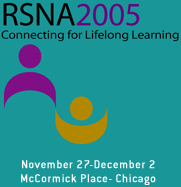
Abstract Archives of the RSNA, 2005
Paolo Castellucci MD, Presenter: Nothing to Disclose
Cristina Nanni, Abstract Co-Author: Nothing to Disclose
Stefano Fanti MD, Abstract Co-Author: Nothing to Disclose
Mohsen Farsad MD, Abstract Co-Author: Nothing to Disclose
Cinzia Pettinato, Abstract Co-Author: Nothing to Disclose
Roberto Franchi, Abstract Co-Author: Nothing to Disclose
Brain tumors are treated with chemotherapy and radiation therapy. After therapy, however, CT and MR may not be conclusive as cancer relapse, post treatment fibrosis, perilesional edema or necrotic areas may present with the same aspect.
Furthermore, at diagnosis CT and MR may not distinguish between benign and malignant lesions.
Aim of our study was to assess the value of 11C-Methionine in patients affected by brain tumor (primary or metastatic) or with suspect of brain tumors at diagnosis and with inconclusive CT
and/or MR.
Our population consisted of 24 patients (13M and 11F) who were referred to our PET center for equivocal findings at brain CT and/or MR. 6 patients had CT only, 5 CT and MR and 13 MR only.
7 patients did not have a biopsy-proven diagnosis of malignant brain tumor but had findings at CT and/or MR suspect but not definitive for brain malignant tumors, while 17 had been treated for malignant brain lesions (9 astro, 3 oligodendroglioma, 2 glioblastoma, 2 metastatic lesions and 1 meningioma).
6/17 had radiation therapy, 6/17 had surgery, 2/17 had surgery and radiation therapy, 1/17 had surgery and chemo, 1/17 had chemo only and 1/17 had chemo, radiation therapy and surgery. Each patient was injected with 370 MBq of 11C-Met and images were acquired 20-30 minutes later in a 15 minutes single step with a dedicated PET/CT scanner.
12/17 patients with known brain tumor had 11C-Met PET scan positive for disease relapse while 5/17 turned out negative. Negative findings were mainly post radiation therapy changes and post surgery changes. 2/7 patients without proven tumor had a positive 11C-Met PET scan, while 5/7 turned out negative. Negative findings were hemangioma, dysplasia, temporal sclerosis and cysts: all these findings were in differential diagnosis with malignant lesions at conventional imaging.
In conclusion 11C-Met PET scan may be a very useful tool to evaluate brain masses in case of equivocal CT and MR. 11C-Met brain PET scan is easy to read, and the uptake of tracer is almost exclusively due to presence of cellular malignant masses both low and high grade, with no significant causes of false positivity in literature.
P.C.,C.N.,S.F.,M.F.,C.P.,R.F.: The undersigned authors transfer all copyright ownership of the manuscript entitled “Role of 11C-Methionine (11C-Met) PET/CT in the Evaluation-Equivocal Findings” to RSNA in the event the work is published. The undersigned authors warrant that the article is original, does not infringe upon any copyright or other propietary right of any third party, is nor under consideration by another journal, and has not been previously published. The final manuscript has been read, and each author’s contribution has been approved by appropriate author. We attest that we have not and will not distribute copies or reprints of this paper for commercial use prior to its publlication in Medical Science Monitor. We further attest that we herein disclosed any and all financial or other relationships which could be construed as a conflict of interest and that all sources of financial support for this study have been disclosed and are indicated in the acknowledgment.
Brain tumors are treated with chemotherapy and radiation therapy. After therapy, however, CT and MR may not be conclusive as cancer relapse, post treatment fibrosis, perilesional edema or necrotic areas may present with the same aspect.
Furthermore, at diagnosis CT and MR may not distinguish between benign and malignant lesions.
Aim of our study was to assess the value of 11C-Methionine in patients affected by brain tumor (primary or metastatic) or with suspect of brain tumors at diagnosis and with inconclusive CT
and/or MR.
Our population consisted of 24 patients (13M and 11F) who were referred to our PET center for equivocal findings at brain CT and/or MR. 6 patients had CT only, 5 CT and MR and 13 MR only.
7 patients did not have a biopsy-proven diagnosis of malignant brain tumor but had findings at CT and/or MR suspect but not definitive for brain malignant tumors, while 17 had been treated for malignant brain lesions (9 astro, 3 oligodendroglioma, 2 glioblastoma, 2 metastatic lesions and 1 meningioma).
6/17 had radiation therapy, 6/17 had surgery, 2/17 had surgery and radiation therapy, 1/17 had surgery and chemo, 1/17 had chemo only and 1/17 had chemo, radiation therapy and surgery. Each patient was injected with 370 MBq of 11C-Met and images were acquired 20-30 minutes later in a 15 minutes single step with a dedicated PET/CT scanner.
12/17 patients with known brain tumor had 11C-Met PET scan positive for disease relapse while 5/17 turned out negative. Negative findings were mainly post radiation therapy changes and post surgery changes. 2/7 patients without proven tumor had a positive 11C-Met PET scan, while 5/7 turned out negative. Negative findings were hemangioma, dysplasia, temporal sclerosis and cysts: all these findings were in differential diagnosis with malignant lesions at conventional imaging.
In conclusion 11C-Met PET scan may be a very useful tool to evaluate brain masses in case of equivocal CT and MR. 11C-Met brain PET scan is easy to read, and the uptake of tracer is almost exclusively due to presence of cellular malignant masses both low and high grade, with no significant causes of false positivity in literature.
P.C.,C.N.,S.F.,M.F.,c.p.,r.f.:
Castellucci, P,
Nanni, C,
Fanti, S,
Farsad, M,
Pettinato, C,
Franchi, R,
CNS Neoplasia: Role of 11C-Methionine (11C-Met) PET/CT in the Evaluation—Equivocal Findings. Radiological Society of North America 2005 Scientific Assembly and Annual Meeting, November 27 - December 2, 2005 ,Chicago IL.
http://archive.rsna.org/2005/4407599.html

